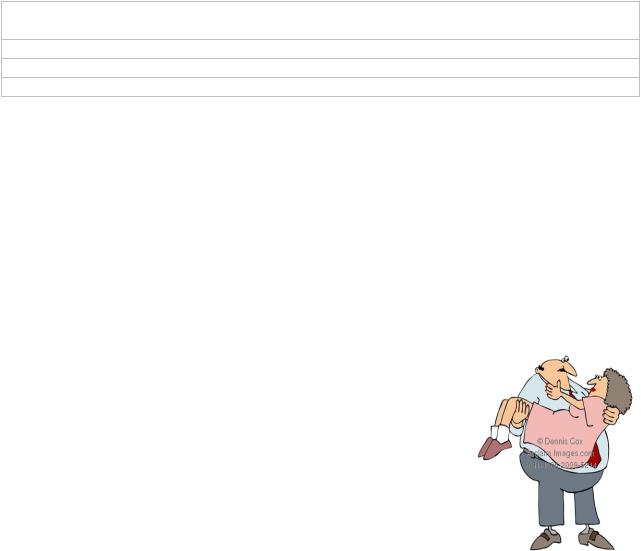
Beginner one-piece
.pdf
Good night! (Night!) |
|
Надобраніч! |
|
See you later / tomorrow! |
|
Побачимосяпізніше |
/ дозавтра! |
Have a nice evening! |
|
Приємноговечора! |
|
Excuse me, please. |
|
Вибачте,будьласка! |
|
Look here! / Look! / Watch out! |
|
Стережися! |
|
Special Days: |
|
Особливідні: |
|
Happy Birthday! / Merry Christmas! / Happy |
Зднемародження!Щасли/ різд! / ваого |
|
|
New Year! |
|
Щасливогоновогороку! |
|
Good luck! / Congratulations! / Well done! |
Щасти!настанова( додій)Вітання/ !Гарна/ |
|
|
|
|
робота (Молодець)! |
|
3. Conversational openings |
|
3Як.розпочатирозмову |
|
Have we met before? |
|
Мивжезнайомі,чинетак? |
|
Your face seems familiar to me. |
|
Вашеобличчямезнайоме.і |
|
Your name sounds familiar. |
|
Вашеім’меязнайоме.і |
|
I’ve heard much about you. |
|
Я багатопроВасчув. |
|
4. Forms of address |
|
4Форми. звертання |
|
Mister Hunter (Mr.) / Missis Hunter (Mrs./ Ms) |
містерХантердо(чолов)міс/Хантерікас |
|
|
/ Miss Brown (Ms) / Sir / Madame / Doctor / |
(дозаміжньжінки)міс/Браундо(дівчиниї) |
|
|
Professor / Ladies and Gentlemen / Officer |
/сердо(літньогочоловіка,незнайомцяабо |
|
|
|
|
військовогоофіцера)мадам/ лікар/ до( |
|
|
|
медпрацівника)професор/ до(професора |
|
|
|
університеті)пані/та до(аудито |
рії) / |
INTRODUCTORY TEXT* |
|
офіцердо(поліцейського) |
|
Body Language |
|
||
Notes to the text: |
|
||
|
|
|
|
body language – моватіла |
|
uneven eye contact – уривчастийзоровий |
|
species – біологічнийвид,порода |
|
контакт |
|
polite greeting – ввічливевітання |
|
intense / prolonged – наполегливийтривалий/ |
|
personal space – особистийпростір |
|
to maintain(ed) – підтримувати |
|
reserved – стриманий,відлюдний |
, |
invasion of privacy – завособистогоювання |
|
замкнений |
|
простору |
|
male and female – чоловітажінки |
|
sign of embarrassment – ознаказбентеження |
|
firm handshake – міцнерукостискання |
to point(ed) – показуватипальцем |
||
to bow(ed) – кланятися |
|
chin / palm – підб/ олоняріддя |
|
to kiss(ed) on the cheek – цілуватищоку |
to touch(ed) bodies – торкатисятіл |
||
You might think body language is universal. After all, we’re the same species, right? But basics like what is considered a polite greeting and definitions of “personal space” vary widely from culture to culture. Americans, for instance, are considered rather reserved in the way they greet friends, and they define personal space more broadly than most other cultures. Knowing how another culture’s basic body language differs from yours may be of great importance to you.
1)Mind how you meet and greet. Americans and Canadians, male and female, tend to greet each other with a nice firm handshake. In Asian countries, the polite form of greeting is to bow, and the lower you bow, the deeper respect you have for the person you are bowing to. In Spain, Portugal, Italy and Eastern Europe, men kiss each other on the cheek.
2)Be careful about eye contact. In America, uneven eye contact is preferable in a conversation – unless it’s someone you care deeply for. In Middle Eastern countries, intense prolonged eye contact is the norm, and the person you’re speaking with will move very close to you to maintain it. The Japanese, on the other hand, consider it an invasion of privacy, and rarely look another person in the eye.

3)Americans, in general, smile when they meet or greet someone. Koreans, however, think it’s rude for adults to smile in public – to them, smiling in public is a sign of embarrassment.
4)Don’t point. Most Americans think nothing of pointing at an object or another person. Native Americans consider it extremely rude to point with a finger, and instead they point with their chin. It’s also rude to point with a finger in China; the polite way is to use the whole hand, palm facing up.
*Тутідаукліятілюструаданнятестівибіркикрилатиханнявисловіввикористаноінформацію |
з |
|
електроннихджерел. |
– Прим.авт. |
|
5) Give the right amount of space. In Asian cultures, particularly China, the concept of personal space is nearly nonexistent. Strangers regularly touch bodies when standing in line for, say, movie tickets. People in Scandinavian countries, on the other hand, need more personal space than we do.
1.Comprehension questions.
1.Is body language universal?
2.What is specific about meeting and greeting in different countries?
3.Where is uneven eye contact preferable?
4.Where is smile considered a sign of embarrassment?
5.How do Native Americans point to objects?
6.Describe the amount of space.
2.Find in the text English equivalents to the following.
Чергазаквиткамикіно, Азіатськікультури,ввічлспосіб,гру,вийий посміхатисяналюдях,розмова,глибокапов, важливетигазначення,варіюватися.
VOCABUALARY PRACTICE
1. Find the vocabulary words and cross them out.
J I M S O R R Y C I P
T H A N K Y O U V T L
R M T X P B A D K S E
P A R D O N M E O O A
N I A C D N P E T K I
P E X C U S E M E B M
L I F W E L C O M E G
E S T H I D G O N P L
Y O U R E G R E A T A
S U I P L E A S E R D
2. |
Choose a suitable phrase to fit the dialogues. |
Thanks, I’m not bad. |
1. |
(sneezes) Atchoo! |
|
2. |
I’m taking my driving test today! |
Happy Birthday! |
3. |
I passed my driving test! |
Good luck! |
4. |
Goodbye! |
Hi! |
5. |
It’s my birthday today! |
Thank you! |
6. |
How are you? |
See you soon / later / tomorrow! |
7. |
Hello! |
Congratulations! / Well done! |
8. |
Here’s your tea. |
Bless you! |

3.What do you say? Choose a phrase from the topical vocabulary.
1.You want to order a coffee. The waiter is reading the newspaper.
2.A friend buys you a drink.
3.A child says ‘Goodnight’ to you.
4.You answer the phone at work. It is 10.30 a.m.
5.You answer the phone at work. It is 3 p.m.
6.It is 2 a.m. on January 1st. You meet a friend on the street.
7.A friend spoke too quickly. You don’t understand.
8.It is 24th December. You meet your boss on the bus.
4.Read the dialogues.
Sandra: Hello, I’m Sandra. What’s your name? Sam: My name’s Sam.
Sandra: Hello, Sam.
*****
Sandra: John, this is Sam Brown. Sam, this is John Mason. Sam: Hello, John.
John: Hello, Sam.
*****
A:Hi, Jim. How are you?
B:Fine, thanks, Rebecca. And you?
A:I’m OK, thanks.
5.Complete the conversations. Check the example (1).
1. A: Hello. My name’s Anna. What’s your |
2. B: ………, Anna. ……… are you? |
name? |
A: Fine, thanks, Ben. ………. …………. ? |
B: Ben. |
B: ………. well, thanks. |
3. C: Hello. My ……….. Carla. What’s …… |
4. D: Hi, Carla. …………. …………. you? |
name? |
C: ………., thanks. ……….. …………. ? |
D: ………. name’s David. |
D: OK, ……………….. . |
6.Put the lines in the conversation into the correct order.
-Fine, thanks.
-I’m OK, thanks. And you?
-Hello. My name’s Rita. What’s your name?
-Hello, Tina. Hello, Mary.
-I’m Tina, and this is Mary.
-Hello, Rita. How are you?
7.Read the text and complete the activities that follow.
The handshake has become a common form of communication all around the world. It is used to say “hello”, “goodbye”, “we agree”, as a greeting upon first acquaintance, and as a mutual sign of goodwill and peace. A handshake can establish a first impression with someone, whether it be good and firm, or limp and clammy. It has made its way to the highest levels of government and society where agreements between nations are sealed. This ritual has “become perhaps our most important non-verbal communicative innovation”.
The most widely accepted theory is that handshaking originated in
medieval Europe where knights would extend their hand to other knights in order to show that they had no weapons hidden or concealed behind their back. This seems to fit quite nicely with
the modern version of a handshake – two people using one single gesture to convey friendship, openness and non-harming.
Regardless of its origins, the handshake has become a solid part of modern life and culture. People of all races, shapes, sizes and status use the handshake as a way to greet a person, make an agreement or say goodbye.
Why is our handshake so important? The way you shake hands speaks volumes about who you are as a person. For some people a handshake is just a useless formality but to others it is a massive indication of a person’s depth of character, trustworthiness and strength. When you shake hands with a person you are doing much more than saying “hello”. You are saying “this is who I am“.
If you are a business person your handshake can be the maker or breaker of a big contract or deal. If you are a doctor or health care provider your handshake can fill a patient with confidence and trust. It is extremely important for all people to learn how to shake hands with meaning.
a. |
Are these sentences true (T) or false (F)? |
1. |
The handshake has become a common form of communication all around the world. |
2. |
This ritual has “become perhaps our most boring verbal communicative innovation”. |
3. |
Handshaking originated in medieval Europe. |
4. |
People of all races, shapes, sizes and status kiss each other to make an agreement or say |
|
goodbye. |
b. |
Fill in the blanks with appropriate words. |
1.The way you shake hands speaks volumes about ………………………………………….
2.When you shake hands with a person you …………………………………………………
3.If you are a business person your handshake can be ………………………………………
4.For some people a handshake is ……………………. but to others it is a ………………...
c.Complete the following phrases using the text.
Common form of ………, ……… acquaintance, mutual ………, non-verbal ………
innovation, medieval ………, ……… hidden, to convey ………, to greet a ………, to fill a patient with ……… .
8. Writing options. Try to make a story on the offered topics.
1.What makes it easy to talk to someone? What traits do you look for in a conversation partner?
2.Have you ever had a great conversation with a complete stranger?
3.What are peculiarities about men and women conversations?
4.What topics are taboos for your culture / personally?
5.Why do people like to learn bad words in another language?
6.Would you like to have a career that requires you to talk to a lot of people? Why?
HUMOUR TIME
Last night I hugged my pillow and dreamt of you... I wish that someday I’d dream about my pillow and I’d be hugging you.

LESSON 1
Family Relations
It is not flesh and blood but the heart which makes us fathers
and sons.
Family faces are magic mirrors. Looking at people who
belong to us, we see the past, present, and future.
Treat your family like friends and your friends like family.
TOPICAL VOCABULARY |
|
|
1. Name |
1. Ім’я |
|
name / first name / Christian name |
ім’я |
|
patronymic / middle name |
побатькові |
|
surname / second name / family name / last |
прізвище |
|
name |
|
|
maiden name / nickname |
дівочепрізвище |
/ прізвисько |
to call(ed) smb after |
назватикогочесть |
|
2. Age |
2Вік. |
|
to be (was / were; been) born |
народитися |
|
generation |
покоління |
|
teenager |
підліток |
|
grown up / adult |
дорослий |
|
middle aged (elderly) person |
літнялюдина |
|
to die(ed) of an illness / for one’s country |
помертичерезхворобу |
/ закраїну |
3. Origin |
3Походження. |
|
to have roots at / to be / to come from |
матикорінняз |
/ походитивід |
countryman |
співвітчизник |
|
4. Family |
5Сім.’я |
|
relatives close / distant |
родичіблизькі |
/ далекі |
ancestors |
пращури (предки) |
|
spouse: husband / wife |
одинізподр |
ужжя:чоловікдружина/ |
parents: father (dad, daddy) / mother (mum) |
батьки: батькомати/ |
|
child (children, pl.): son / daughter |
дитинадіти(, |
мн.):синдочка/ |
first-born / baby / toddler |
первістокновонароджена/ дит/ и,тина |
|
|
якапочинаєходити |
|
the only child / twins / triplets |
єдинадитина |
/ близнюкитрійнята/ |
grandfather (grandpa / granddad) / |
дідусьбабуся/ |
|
grandmother (granny / grandma) |
|
|
grandparents / great grandparents |
дідусьбабусяразом( )прабатьки/ |
|
|
(прадідусьпрабабуся) |
|
grandson / granddaughter |
онуконучка/ |
|
uncle / aunt |
дядьтіт/ коа |
|
cousin |
двоюріднийбратсестра/ |
|
nephew / niece |
племінникнебіж( )племінниця/ небога( ) |
|

in-laws |
родичічоловікаж/ нки |
|
|
father-in-law / mother-in-law |
тесть,свекортеща/ ,свекруха |
|
|
son-in-law / daughter-in-law |
зятьневістка/ |
|
|
to adopt(ed) |
усиновитиудочерити/ |
|
|
orphan / orphanage |
сирота / притулокдлядітей |
|
|
step(foster) child / half brother(sister) |
неріднадитиназведений/ братсестра( ) |
|
|
step(foster) parents |
неріднібатьки |
|
|
to christen(ed) a child |
охреститидитину |
|
|
godfather / godmother |
хрещ/ ещенаний |
|
|
godson / goddaughter |
хрещ/ ещеницяник |
|
|
to be pregnant / carry(ed) a child / to |
бутивагітноюочікувати/ дитину |
|
|
expect(ed) a baby |
|
|
|
to give birth to a child |
народити |
тину |
|
to bring (brought; brought) up / to raise(ed) |
виховуватидитину |
|
|
to take after / to resemble(d) |
бутисхожим |
(на) |
|
to inherit(ed) |
успадкувати |
|
|
5. Marriage |
6Шлюб. |
|
|
date(ed) / to go out with |
побачення / ходитинапобачення |
/ |
|
|
зустрічатисьізкимось |
|
|
single / married |
неодруженийнезаміжня( )одружений/ |
|
|
|
(заміжня) |
|
|
bachelor / spinster |
парубхол( )старадіво/ стяк |
|
|
to become engaged with smb / engagement |
заручитисякимосьзаручини/ |
|
|
to propose (proposal) |
освідчитисяосвідчення( ) |
|
|
to marry(ied) smb / to get married with |
одружитисявийти( заміж) |
|
|
wedding (civil / church) |
весілля (циві/ льненчання |
) |
|
bridegroom (fiancé) / bride (fiancée) |
нареченийнаречена/ |
|
|
best-man / bridesmaid |
бояд/ ружкаин |
|
|
newly-weds / just married / happy couple |
щойно друженіщаслива/ пара |
|
|
to go on a honeymoon |
поїхативмедовиймісяць |
|
|
to divorce(d) / divorce |
розлучитися / розлучення |
|
|
ex-husband / ex-wife |
колишнійчоловікдружина/ |
|
|
widow / widower |
вдовавдівець/ |
|
|
INTRODUCTORY TEXT
English Family Life
Notes to the text:
the affairs of the home – домашні справи castle – фортеця,замок
used to – тут:ранішепозначає( дії,щобули звичнимиминулому
to be caused – спричинятися new laws – новізакони
to increase – зростати,збільшуватися
one marriage in every three – однеізтрьох одружень
take responsibility – бративідповідальність keep in touch – підтримувати зв'язок
treat their children as equals – відноситися дітейякдорівнихсобіза(віком)
make decisions – прийматирішення
be more involved – прийматиак тивнішу участь
increased leisure facilities – збільшення мождлвідпочинкуивостейя
opportunities – можливості family holiday – сімейнийвідпочинок older generation – старшепокоління pensioners – пенсіонери
entirely independently – повністюнезалежно
to support the increasing number of elderly –
підтзримуватиостакількістьюдейчу похилоговіку
private or state owned – уприватнійчи держвласвностіій
The English are a nation of stay-at-home. “There is no place like home,” they say. And when the man is not working he is at home in the company of his wife and children and busies himself with the affairs of the home. “The Englishman’s home is his castle,” is a saying known all over the world. And it is true.
A “typical” British family used to consist of mother, father and two children, but in recent years there have been many changes in family life. Some of these have been caused by new laws and others are the result of changes in society. For example, since the law made it easier to get a divorce, the number of divorces has increased. In fact one marriage in every three now ends in divorce. This means that there are a lot of one-parent families. Society is now more tolerant than it used to be of unmarried people, unmarried couples and single parents.
You might think that marriage and the family are not so popular as they once were. However, the majority of divorced people marry again, and they sometimes take responsibility for a second family.
Members of a family – grandparents, aunts, uncles, cousins – keep in touch, but they see less of each other than they used to. This is because people often move away from their home town to work, and so the family becomes less united. Christmas is the traditional season for reunions.
Relationships within the family are different now. Parents treat their children more as equals than they used to, and children have more freedom to make their own decisions. The father is more involved with bringing up children, often because the mother goes out to work. Increased leisure facilities and more money mean that there are greater opportunities outside the home. Although the family holiday is still an important part of family life (usually taken in August, and often abroad) many children have holidays away from their parents, often with a school party or other organized group.
Who looks after the older generation? There are about 10 million old-age pensioners in Britain, of whom about 750,000 cannot live entirely independently. The government gives financial help in the form of a pension but in the future it will be more and more difficult for the nation economy to support the increasing number of elderly. At the present time, more than half of all old people are looked after at home. Many others live in Old Peoples’ Homes, which may be private or state owned.
1. Comprehension questions.
1. What type of nation are the English?
2. What caused family changes in Britain?
3. What’s the traditional season for relatives’ reunion?
4. What changes can be observed in relationships between children and parents? 5. How and by whom is older generation looked after?
2. Find in the text English equivalents to the following. |
|
Нація домосидів, зайнятийдомашнісправами,приказка, усуспільствііни, |
|
розлучи,неповноцінсім’я,тисяолера,неодруженіп,аптнийри |
окинутидомівки, |
традиційнийчасвозз’єдн,мбільшеннятисвободи,вихованнядітей,доглядатилітніх |
|
людей,надавфіндоатинсову,помогуритулокд юдейяпохилоговіку. |
|
VOCABUALARY PRACTICE
1. Fill in the missing vowels into the words expressing relations in the family.
1. a h _ sb _ nd |
10.tw _ ns |
2. an _ ncl _ |
11. gr _ ndp _ r _ nts |
3. a st _ pm _ th _ r |
12. a m _ rr _ _ g _ |
4. an _ _ nt |
13. _ nc _ st _rs |
5. a d _ _ ght _r |
14. a h _ n _ _ m _ _n |
6. a n _ ph _ w |
15. an _ rph _ n |

7.a n _ _ c _
8.a f _ th _ r - _ n – l _ w
9.a c _ _ s _ n
16. d _st _ nt r _ l _t _ v _ s
17.a sp _ nst _ r
18.a h _ lf – br _ th _ r
2. Study Laura’s family tree.
THE MARTINELLI FAMILY
|
Antonio (Tony) = Barbara |
|
|
Debbie = Steve |
Laura |
Silvia |
Danny |
Robert |
Lisa |
|
|
a) Complete the sentences about Laura’s family.
1)Tony and Barbara are Laura’s … and …
2)They’ve got two … and two …
3)Steve is Debbie’s …
4)Debbie is Steve’s …
5)They’ve got two …, a boy called Robert and a baby girl called Lisa.
6)Laura’s got two … and one …
7)Her … are called Tony and Barbara.
b) Use the words below and describe relationships in Laura’s family.
Grandmother / grandfather |
aunt / uncle niece / nephew cousin |
Laura to Lisa |
Lisa to Danny |
Danny to Lisa |
Barbara to Robert |
Robert to Lisa |
Tony to Lisa |
Example: Laura is Lisa’s aunt. |
|
c)Rewrite the paragraph putting in the correct punctuation (full stops and capital letters).
‘my name’s laura and i’m twenty-two years old i come from california in america but i’m in york at the moment i’m a student at the university york is a very beautiful old city and i like living here very much’
3. Read about Cher, a famous American singer and film star, and answer the questions.
1)What nationality were her ancestors?
2)What was her first husband’s name?
3)What was the name of their first hit record?
4)How many children has she got?
Cher – Actress, Singer, Oscar Winner
Cher’s real name is Cherilyn La Pierre. Her family ancestors were French, Turkish, Armenian and Cherokee Indian. Her first husband was called Sonny Bono and together, as ‘Sony and Cher’, their record Got You, Babe, was a big hit in 1965. Cher won Oscar for Best Actress in the film Moonstruck in 1988. She has got two children, a daughter called Chastity by her first husband and a son by her second husband called Elijah Blue.
4. Read and translate the following dialogues. A.: Do you want to see my family album?
B.: With pleasure.
A.: These are my parents. Here they are very young. This is their wedding. B.: You look a lot like your mother. You have the same eyes and smile.
A.: You think so? All relatives of my father say that I look a lot like him. We have the same nose. Look: this is my grandma. Here she is 25 years old.
B.: What a cutie! It's hard to believe that we will be 70 some day too. A.: I prefer not to think about it.
B.: Who is this attractive guy?
A.: This is my brother. He is a sailor. The uniform looks good on him, doesn't it? B.: Very much. And where is he now?
A.: He’s sailing on the Mediterranean sea. He’s coming on holiday soon. We’ll have a party to celebrate his arrival. Are you coming?
B.: For sure!
*****
A:Hi, Dan! We are making a survey on family ties. Can I ask you some questions?
B:Yes, please.
A:What makes a home a comfortable, pleasant place to live in?
B:I think that kind and good relations between people make their home a pleasant place for them. When you feel love and support you cope with any difficulty.
A:Who supported you and helped you find the way out of difficulties in your life?
B:My parents and friends tried to help me in such situations.
A:Whom do you admire in your family? What have you learnt to do from this person?
B:My grandmother. She is a wonderful person. Her life wasn’t easy, but she always had a
positive attitude to the events that happened. She taught me to be patient and tolerant to other people.
A:Do you agree that your family is the most wonderful treasure you have?
B:Yes, sure.
5.Read the text below and decide which answer (A, B, C, D) best fits each space.
Family Helping
Do you (0) feel depressed? Do you and your brothers or sisters (1) _______ to argue all the time and you don’t understand why? Does your brother or sister (2) _______ you, or is everything perfect?
Statistics show that there are times in every family when things just (3) _______ out of control. It’s nobody’s (4) _______, but everybody’s responsibility. At times (5) _______ that, Family Helpline can help. Here at Family Helpline, we care (6) _______ families. We want to help you make your family work. Our trained counselors deal (7) _______ people just like you every day. We are not always successful, but we (8) _______ help many families to live together again in peace.
Our counselors help you to stop (9) _______ each other of causing the problem. You all want to (10) _______ a solution and sometimes talking to somebody outside the family makes a difference. We’re here to listen call our operators on 555-26515. They’re available 24 hours a day, seven days a week.
0. |
A be |
B behave |
C feel |
D act |
1. |
A seem |
B look |
C resemble |
D involve |
2. |
A argue |
B complain |
C annoy |
D mind |
3. |
A go |
B get |
C come |
D turn |
4. |
A fault |
B blame |
C cause |
D reason |
5. |
A such |
B as |
C similar |
D like |

6. |
A over |
B about |
C with |
D of |
7. |
A for |
B with |
C at |
D by |
8. |
A do |
B are |
C try |
D agree |
9. |
A attacking |
B blaming |
C criticizing |
D accusing |
10. A make |
B find |
C get |
D do |
|
6. Write one word in each gap.
Arranged Marriages
The usual western idea of marriage is that you meet someone, (1) _______ in love, and then decide to marry each other. For those born (2) _______ some cultures, however, marriage may have quite a different meaning. In an arranged marriage, it is the parents who choose the partner and it’s possible (3) _______ the young person getting married not to meet their future bride or groom (4) _______ person until the day of the wedding. Indeed, a young person might be promised to another (5) _______ a child, many years before the wedding day.
Amongst communities that practice arranged marriage, it’s not unusual for a generation (6)
_______ to open up between parents and children, with many young people refusing to accept an arranged marriage. However, if the parents treat each other (7) _______ respect and recognize that they are both (8) _______ equal value, there doesn’t seem to be any real barrier to having a happy married life.
7.There are many patterns of family relations. Study some of them, add to their characteristics. Think about the ideal family type.
A friendly family |
Members of family always help each other. |
A caring family |
Members of family take care of each other. |
A hospitable family |
They like to invite guests. |
A conservative family |
Parents don’t allow their children go out late. |
An ideal family |
? |
8. Writing options. Try to make a story on the offered topics.
1.What are some qualities that you think are important in a spouse or a partner?
2.Do you think it is better to be single or to be married?
3.Do you think arranged marriages are a good idea? Why or why not?
4.Do you want a husband or wife who is older, younger or the same age as you?
5.What makes a happy marriage?
6.Can you name a famous happily married couple?
7.Where do you want to go for your honeymoon?
8.What are some of the main reasons people get divorced?
HUMOUR TIME
Fred: Have you ever seen one of those machines that can tell when someone is telling a lie? Joe: Seen one? I married one!
*****
-So you want to become my son-in-law?
-Not exactly. I just want to marry your daughter.
*****
Dad: Son, what do you want for your 18th birthday? Son: Just a radio, dad... With a sports car around it.
*****
My new girlfriend is a pretty as a flower. A cauliflower.
